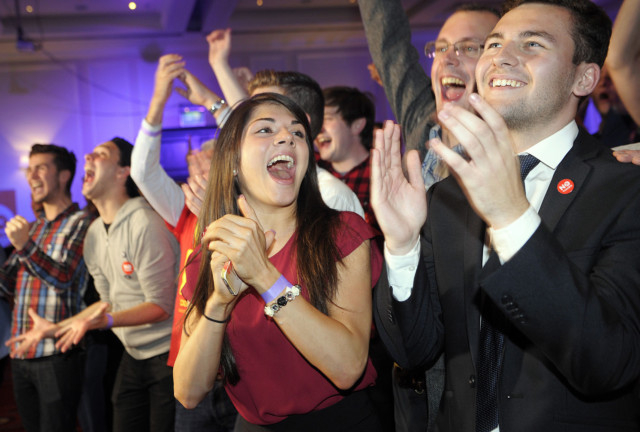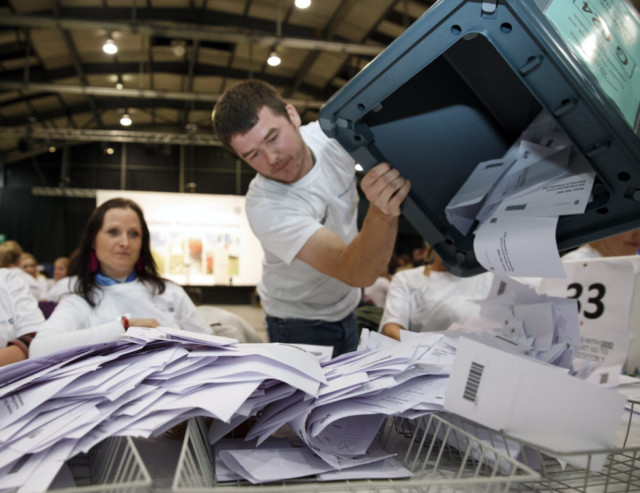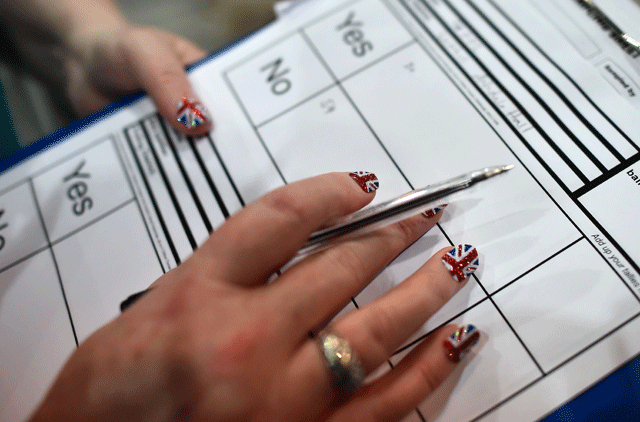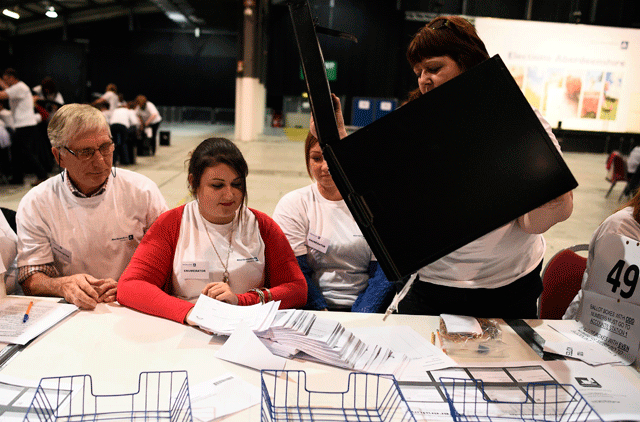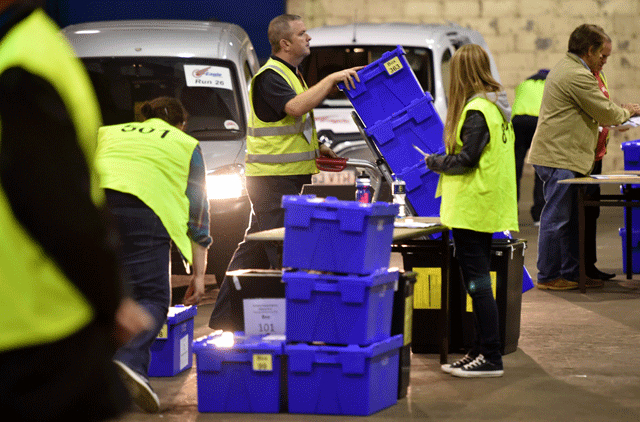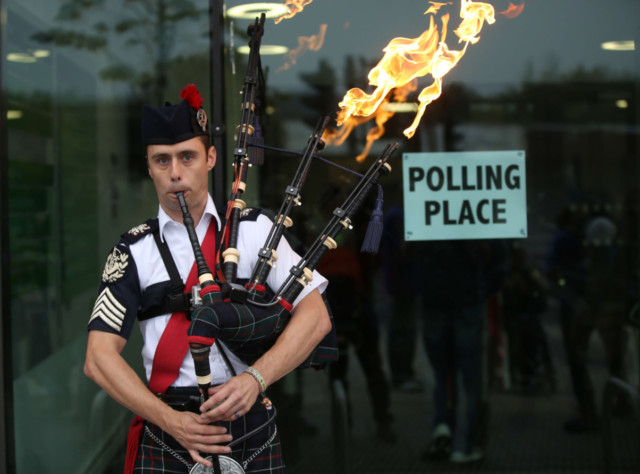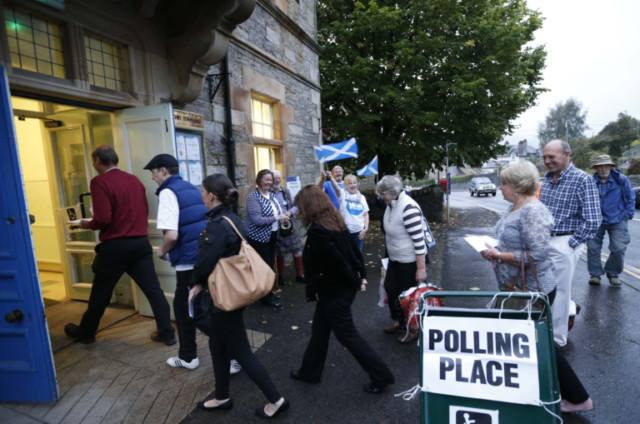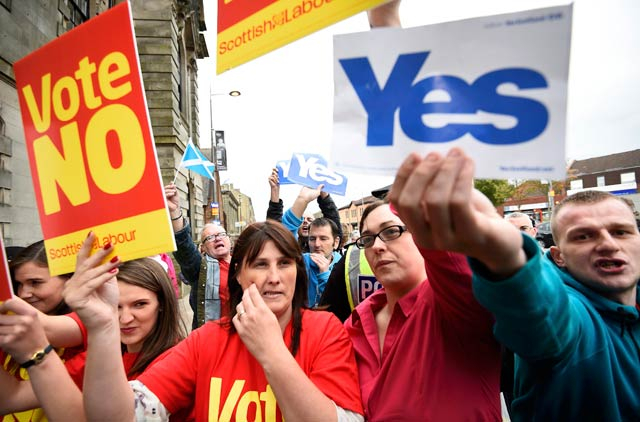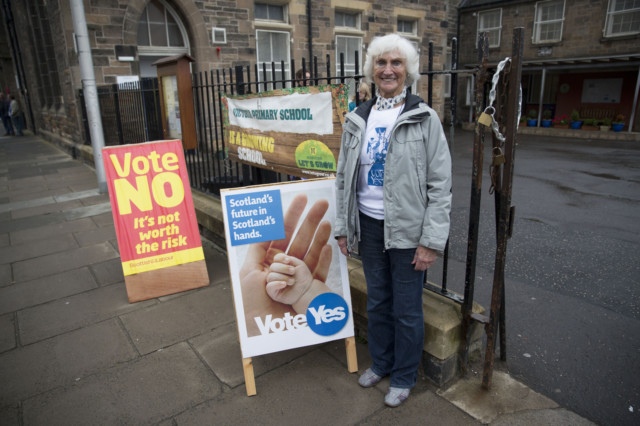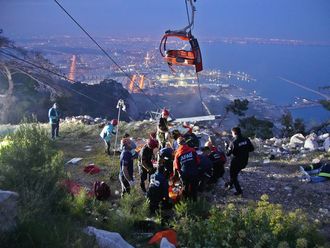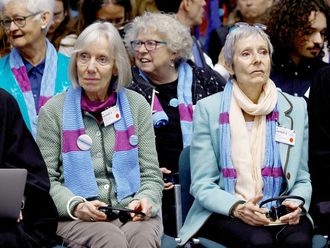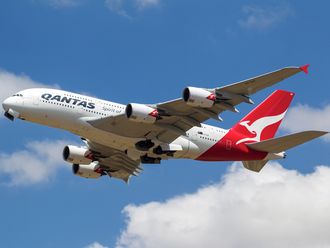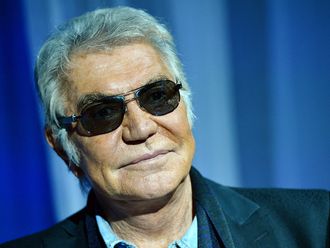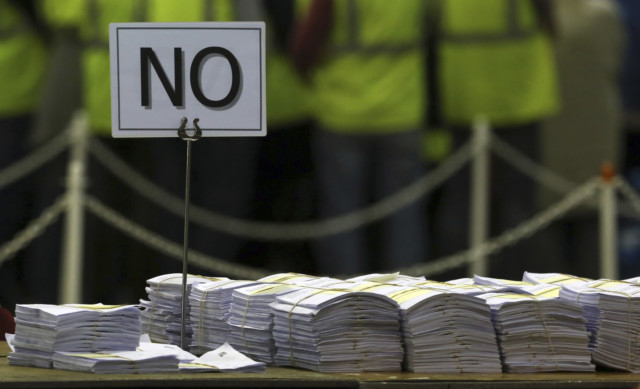
9.30am UAE time: Wider margin of victory
Scottish voters have rejected independence, deciding to remain part of the United Kingdom after a historic referendum that shook the country to its core.
The decision prevented a rupture of a 307-year union with England, bringing a huge sigh of relief to the British political establishment. Scots voted 55 per cent to 45 per cent against independence in a vote that saw an unprecedented turnout.
Pro-Union supporters celebrate as Scottish referendum polling results are announced at the Royal Highland Centre in Edinburgh, Scotland, on September 19, 2014.
I've just spoken to Alex Salmond, congratulating him on a hard-fought campaign. I'm delighted the SNP will join talks on further devolution.— David Cameron (@David_Cameron) September 19, 2014
A majority of voters did not embrace Scottish First Minister Alex Salmond's impassioned plea to launch a new state, choosing instead the security offered by remaining in the United Kingdom. "We have chosen unity over division," Alistair Darling, head of the No campaign, said early on Friday in Glasgow. "Today is a momentous day for Scotland and the United Kingdom as a whole."
Salmond conceded defeat, saying "we know it is a majority for the No campaign," and called on Scots to accept the results of the vote. "This has been a triumph for the democratic process and for participation in politics," he said, insisting that London-based politicians were now expected to honor their promises of giving more powers to Scotland.
The No campaign won the capital city, Edinburgh, by a margin of 61 per cent to 38 per cent and triumphed by 59 per cent to 41 per cent in Salmond's home city of Aberdeen. The Yes campaign won Glasgow, Scotland's biggest city, but it was not enough.
Should Scotland be an independent country? (final tally)
(Source: Electoral Commission, Scotland)
| Votes | Share of Vote (%) | |
|---|---|---|
| Yes | 1,617,989 | 44.65 |
| No | 2,001,926 | 55.25 |
| Rejected Papers | 3,429 | 0.1 |
| Total | 3,623,344 | 100 |
Totals per local government areas (final results)
(Source: Electoral Commission, Scotland)
|
Local Government Area |
Total Votes Counted | YES | NO | Rejected Papers |
|---|---|---|---|---|
| Aberdeen City | 143,664 | 59,390 | 84,094 | 180 |
| Aberdeenshire | 180,045 | 71,337 | 108,606 | 102 |
| Angus | 80,302 | 35,044 | 45,192 | 66 |
| Argyll & Bute | 63,516 | 26,324 | 37,143 | 49 |
| Clackmannanshire | 35,410 | 16,350 | 19,036 | 24 |
| Comhairle Nan Eilean Siar | 19,758 | 9,195 | 10,544 | 19 |
| Dumfries and Galloway | 106,775 | 36,614 | 70,039 | 122 |
| Dundee | 93,592 | 53,620 | 39,880 | 92 |
| East Ayrshire | 84,262 | 39,762 | 44,442 | 58 |
| East Dunbartonshire | 79,011 | 30,624 | 48,314 | 73 |
| East Lothian | 71,798 | 27,467 | 44,283 | 48 |
| East Renfrewshire | 66,021 | 24,287 | 41,690 | 44 |
| City of Edinburgh | 319,022 | 123,927 | 194,638 | 460 |
| Falkirk | 108,626 | 50,489 | 58,030 | 107 |
| Fife | 254,162 | 114,148 | 139,788 | 226 |
| Glasgow | 364,664 | 194,779 | 169,347 | 538 |
| Highland | 165,976 | 78,069 | 87,739 | 168 |
| Inverclyde | 54,601 | 27,243 | 27,329 | 29 |
| Midlothian | 60,395 | 26,370 | 33,972 | 53 |
| Moray | 64,205 | 27,232 | 36,935 | 38 |
| North Ayrshire | 96,173 | 47,072 | 49,016 | 85 |
| North Lanarkshire | 226,883 | 115,783 | 110,922 | 178 |
| Orkney | 14,907 | 4,883 | 10,004 | 20 |
| Perth & Kinross | 104,285 | 41,475 | 62,714 | 96 |
| Renfrewshire | 117,612 | 55,466 | 62,067 | 79 |
| Scottish Borders | 83,526 | 27,906 | 55,553 | 67 |
| Shetland | 15,635 | 5,669 | 9,951 | 15 |
| South Ayrshire | 81,716 | 34,402 | 47,247 | 67 |
| South Lanarkshire | 222,927 | 100,990 | 121,800 | 137 |
| Stirling | 62,225 | 25,010 | 37,153 | 62 |
| West Dunbartonshire | 62,532 | 33,720 | 28,776 | 36 |
| West Lothian | 119,115 | 53,342 | 65,682 | 91 |
| Total | 3,623,344 | 1,617,989 | 2,001,926 | 3,429 |
Salmond had argued that Scots could go it alone because of its extensive oil reserves and high levels of ingenuity and education. He said Scotland would flourish on its own, free of interference from any London-based government.
Many saw it as a "heads versus hearts" campaign, with cautious older Scots concluding that independence would be too risky financially, while younger ones were enamored with the idea of building their own country.
The result saves British Prime Minister David Cameron from a historic defeat and also helps opposition chief Ed Miliband by keeping his many Labour Party lawmakers in Scotland in place. His party would have found it harder to win a national election in 2015 without that support from Scotland.
Pound surge
The pound surged ahead of the result, which gave the Better Together campaign a wider margin of victory than suggested in opinion polls. The result was based on 29 of the 32 local authorities declared after a record turnout of more than 90 per cent in some regions.
Let's not dwell on the distance we've fallen short - let us dwell on the distance we have travelled— Alex Salmond (@AlexSalmond) September 19, 2014
Former Prime Minister Gordon Brown, a Scot, returned to prominence with a dramatic barnstorming campaign in support of the union in the final days before the referendum vote. Brown argued passionately that Scots could be devoted to Scotland but still proud of their place in the United Kingdom, rejecting the argument that independence was the patriotic choice. "There is not a cemetery in Europe that does not have Scots, English, Welsh and Irish lined side by side," Brown said in his final speech before the vote. "We not only won these wars together, we built the peace together. What we have built together by sacrificing and sharing, let no narrow nationalism split asunder."
For his part, Cameron - aware that his Conservative Party is widely loathed in Scotland - begged voters not to use a vote for independence as a way to bash his party. The vote against independence keeps the UK from losing a substantial part of its territory and oil reserves and prevents it from having to find a new base for its nuclear arsenal, now housed in Scotland. It had also faced a possible loss of influence within international institutions, including the 28-nation European Union and the United Nations.
The decision also means Britain can avoid a prolonged period of financial insecurity that had been predicted by some if Scotland broke away.
In return for staying in the union, Scotland's voters have been promised significant - though somewhat unspecified - new powers by the British government, which had feared losing Scotland forever.
9.25 am UAE time: Alex Salmond admits defeat
Scottish National Party leader Alex Salmond, who heads the semi-autonomous government in Edinburgh, admits defeat in Scotland referendum
“I think most people looked at the question and realized that voting for independence was just too high in terms of the Scottish economy,” Chief Secretary to the Treasury Danny Alexander, a Liberal Democrat, said in an interview. “What we have to do now is make sure that we get on and deliver quickly and strongly the agenda for a stronger Scottish Parliament within the UK.”
Supporters from the "No" Campaign watch as votes are announced, at the Better Together Campaign headquarters in Glasgow, Scotland September 19, 2014.
Cameron, who called Darling this morning to congratulate him on his successful campaign, is due to give a statement at about 7 am in London.
8.45am UAE time: BBC prediction
Scotland rejected independence in a referendum, with the campaign to keep the country in the UK prevailing by a wider margin than predicted in the most recent polls, according to BBC projections.
With 26 of Scotland’s 32 local authorities declared, the Better Together camp backed by Prime Minister David Cameron and the main UK parties had garnered 54 per cent of the vote, while the “yes” campaign led by Scottish National Party leader Alex Salmond had 46 per cent.
“The evidence that the ‘no’ side is going to win is beginning to stack up,” said John Curtice, professor of politics at Strathclyde University. The result in Glasgow “adds further weight that the ‘no’ side has won the referendum and won it pretty comfortably,” he said.
I've spoken to Alistair Darling - and congratulated him on an well-fought campaign. #indyref— David Cameron (@David_Cameron) September 19, 2014
Totals per local government areas
(Source: Electoral Commission, Scotland, 8.45am UAE time)
|
Local Government Area |
Total Votes Counted | YES | NO | Rejected Papers |
|---|---|---|---|---|
| Aberdeen City | 143,664 | 59,390 | 84,094 | 180 |
| Aberdeenshire | Awaiting Results | |||
| Angus | 80,302 | 35,044 | 45,192 | 66 |
| Argyll & Bute | Awaiting Results | |||
| Clackmannanshire | 35,410 | 16,350 | 19,036 | 24 |
| Comhairle Nan Eilean Siar | 19,758 | 9,195 | 10,544 | 19 |
| Dumfries and Galloway | 106,775 | 36,614 | 70,039 | 122 |
| Dundee | 93,592 | 53,620 | 39,880 | 92 |
| East Ayrshire | 84,262 | 39,762 | 44,442 | 58 |
| East Dunbartonshire | 79,011 | 30,624 | 48,314 | 73 |
| East Lothian | 71,798 | 27,467 | 44,283 | 48 |
| East Renfrewshire | 66,021 | 24,287 | 41,690 | 44 |
| City of Edinburgh | Awaiting Results | |||
| Falkirk | 108,626 | 50,489 | 58,030 | 107 |
| Fife | Awaiting Results | |||
| Glasgow | 364,664 | 194,779 | 169,347 | 538 |
| Highland | Awaiting Results | |||
| Inverclyde | 54,601 | 27,243 | 27,329 | 29 |
| Midlothian | 60,395 | 26,370 | 33,972 | 53 |
| Moray | Awaiting Results | |||
| North Ayrshire | 96,173 | 47,072 | 49,016 | 85 |
| North Lanarkshire | 226,883 | 115,783 | 110,922 | 178 |
| Orkney | 14,907 | 4,883 | 10,004 | 20 |
| Perth & Kinross | 104,285 | 41,475 | 62,714 | 96 |
| Renfrewshire | 117,612 | 55,466 | 62,067 | 79 |
| Scottish Borders | 83,526 | 27,906 | 55,553 | 67 |
| Shetland | 15,635 | 5,669 | 9,951 | 15 |
| South Ayrshire | 81,716 | 34,402 | 47,247 | 67 |
| South Lanarkshire | 222,927 | 100,990 | 121,800 | 137 |
| Stirling | 62,225 | 25,010 | 37,153 | 62 |
| West Dunbartonshire | 62,532 | 33,720 | 28,776 | 36 |
| West Lothian | 119,115 | 53,342 | 65,682 | 91 |
| Total | 2,576,415 | 1,176,952 | 1,397,077 | 2,386 |
'The evidence that the ‘no’ side is going to win is beginning to stack up'
Early results in Scotland's independence referendum put the “no” side ahead, with a senior government official calling victory for the campaign to keep the country in the UK.
Pro-union supporters celebrate in Glasgow, Scotland.
With more than half of Scotland's 32 local authorities declared, the Better Together camp backed by Prime Minister David Cameron and the main UK parties had garnered 56 per cent of the vote, while the “yes” campaign led by Scottish National Party leader Alex Salmond had 44 per cent.
“The evidence that the ‘no’ side is going to win is beginning to stack up, but the success is not as substantial as they would have hoped at the beginning of this campaign,” said John Curtice, professor of politics at Strathclyde University. The pound surged as counting continued of the ballots cast across Scotland.
“It does look like we have secured a ‘no’ vote,” Chief Secretary to the Treasury Danny Alexander, a Liberal Democrat and the most senior Scot in the UK government, said in an interview on Sky News. “But a ‘no’ vote is also for change, it’s our responsibility to get on with that.”
8am UAE time, 19/09/2014: Mick O'Reilly, Senior Associate Editor, reporting from Glasgow
Pro-independence campaigners seem to remain 5 percentage points short of earning a majority after voters in Glasgow voted 'yes' – but just not in enough numbers to reverse 'no' trends elsewhere across Scotland.
With nine council left to declare results, no leads by about 200,000 votes, at 1,256,372 to 1,055,716.
Voter turnout is averaging at a 85 per cent.
Should Scotland be an independent country?
(Source: Electoral Commission, Scotland)
As at September 19th 2014 (7.55am, UAE time)
| Votes | Share of Vote (%) | |
|---|---|---|
| Yes | 172,426 | 47.2 |
| No | 178,811 | 52.7 |
| Rejected Papers | 424 | 0.1 |
| Total | 548,070 | 100 |
Results start to trickle in
Campaigners fighting to keep Scotland in the United Kingdom have claimed victory, amid signs that a "silent majority" of No voters turned out in vast numbers in Thursday's referendum to defeat Alex Salmond's push for independence.
Treasury minister Danny Alexander reflected growing confidence in the No camp of victory when he declared: "It does look like we have a No vote." Ruth Davidson, Tory leader in Scotland, claimed the margin of victory could be in double figures.
Should Scotland be an independent country?
(Source: Electoral Commission, Scotland)
As at September 19th 2014 (7am UAE time)
| Votes | Share of Vote (%) | |
|---|---|---|
| Yes | 63,340 | 45.1 |
| No | 76,864 | 54.8 |
| Rejected Papers | 107 | 0.1 |
| Total | 140,311 | 100 |
Yes supporters held their heads in their hands as the first results came in amid signs that Mr Salmond's passionate campaign for independence had failed to convince wavering Scots to break their links with the rest of the UK.
In the tiny county of Clackmannanshire, targeted by Mr Salmond's Yes campaign, the No side won by 54 to 46 per cent, while in Orkney there was a No majority of 2:1. Michael Gove, chief whip, declared: "It looks as if the UK will be safe tomorrow."
After two years of fierce debate on Scotland's destiny, voters turned out en masse to have their say on the future of the 307-year-old union, with a turnout approaching 90 per cent in some areas.
A final result is not expected to be known until breakfast time, but No campaigners were in buoyant mood amid signs that hundreds of thousands of Scots who had kept their voting intentions to themselves had backed the union.
Meanwhile, Mr Salmond's hopes of mobilising an army of working class voters were dented by news of relatively low turnouts in big urban areas: in Glasgow the figure was 75 per cent and in Dundee 79 per cent.
However, much still depended on the outcome of polling in Edinburgh and Glasgow, Scotland's two biggest cities, which will be among the last to declare with final results expected at breakfast time on Friday.
After the polls closed, YouGov, the pollster, released a poll predicting a 54 per cent to 46 per cent win for No. The result was based on a post-voting survey of people the company had polled earlier in the week.
David Cameron was said by aides to be preparing a major statement on the future constitutional settlement for the whole UK on Friday; he has promised that a No vote would trigger a transfer of new powers to the Scottish parliament.
The Queen, who was said by aides to be following the referendum "very, very closely" at Balmoral, is also expected to make a written statement on Friday on the implications of the vote for the UK.
A spokesman for the chief counting officer said there were no reports of difficulties with voting, and queues had been managed efficiently. Reports from individual local authorities suggested that by mid-afternoon voters had come in a steady stream rather than sudden surges.
Both sides, meanwhile, said they had put tens of thousands of volunteers on the streets for a final big push to get supporters to the polling stations. Better Together said they had an estimated 30,000-35,000 people working on the day, knocking on doors, delivering leaflets and making telephone calls. Yes Scotland put its estimate at 40,000.
The scale of activity on polling day reflected a campaign that gathered energy as it neared its climax. The Yes campaign claimed one of its highest-profile celebrity endorsements just after polls opened, when Andy Murray, the tennis player and former Wimbledon champion, tweeted his support for independence.
Dozens of pro-union MPs, especially from Labour, travelled north of the border as they sought to halt any last-minute momentum building behind the Yes campaign. Despite having been harassed during a walkabout in Edinburgh two days ago, Ed Miliband spent the day knocking on doors in Glasgow. Dozens of other Labour MPs travelled to other parts of the country, while Tim Farron, the Liberal Democrat president, campaigned in the Borders.
Expectations of violence at polling booths were largely unfounded, with few reports of aggressive behaviour.
Should Scotland be an independent country?
Source: Electoral Commission, Scotland
As at September 19th 2014 (5.20am UAE time)
| Votes | Share of Vote (%) | |
|---|---|---|
| Yes | 26,902 | 40.8 |
| No | 38,991 | 59.1 |
| Rejected Papers | 59 | 0.1 |
| Total | 65,952 | 100 |
5am UAE time, 19/09/2014: Mick O'Reilly, Senior Associate Editor, reports from Glasgow
Orkney rejected independence for Scotland with a 10,004 to 4,883 majority. The declaration quickly followed a first official results gave the 'no' side a 54 per cent to 46 per cent win in Clackmannanshire, a small council district in south central Scotland.
There, the 'no' side earned 19,036 and 'yes' 16,350 votes. The two results were from small councils, with Glasgow being the largest city. There, the 'yes' side is claiming a 52-48 lead in unofficial counts.
Trend was not indicative of a 'no' win
The first official results gave the 'no' side a 54 per cent to 46 per cent win in Clackmannanshire, a small council district in south central Scotland.
The 'no' side earned 19,036 and 'yes' 16,350 votes.
Turnout in the referendum is expected to exceed 90 per cent in Edinburgh, more than 88 per cent in Glasgow, with other regions all reporting heavy voting patterns. 'Yes' representatives said that the trend was not indicative of a 'no' win.
3.00am UAE time (19/09/2019): Mick O'Reilly, Senior Associate Editor, reports from Glasgow
Turnout in the referendum is expected to exceed 90 per cent in Edinburgh, more than 88 per cent in Glasgow, with other regions all reporting heaving voting patterns.
The first official Scotland local turnouts had been reported, with 83.7 per cent in Orkney and 88.6 per cent in Clackmannanshire, according to the BBC.
First results are expected by 2am local time (5am UAE time) in the referendum that will determine the future makeup of the United Kingdom. Political analysts believe that the higher turnout will favour the 'yes' side.
Workers begin the counting process at a counting centre in Aberdeen, Scotland.
1.00am UAE time (19/09/2019)
Polls across Scotland have just closed, with officials reporting a very heavy turnout for the referendum that determine the future makeup of the United Kingdom.
Counting across 32 council districts will be getting underway shortly, with results due within an estimated four to six hours.
7.00pm UAE time (18/09/2019)
Scotland voted on Thursday on whether to stay within the United Kingdom or end the 307-year-old union with England and become an independent nation in a finely balanced referendum with far-reaching consequences.
From remote highlands and islands to the tough city estates of Glasgow, people were almost equally divided over a vote watched closely by Britain's allies, investors and restive regions at home and abroad.
Pre-voting opinion polls gave the "No" campaign -- those in favour of remaining in the United Kingdom -- a slight edge. But hundreds of thousands of people still making up their minds held the key as polling stations opened.
Tennis star Andy Murray sent a powerful last-minute message in support of the pro-independence "Yes" vote, tweeting "Let's do this" after months of silence on his views.
Murray appears to back independence
The Scottish tennis ace on Thursday appeared to lend his support to independence on polling day and condemned negative tactics by the "No" camp in a tweet that quickly went viral.
"Huge day for Scotland today! 'No' campaign negativity last few days totally swayed my view on it. Excited to see the outcome. Let's do this!" read the tweet on his account @andy_murray.
The last exclamation echoes the one used by pro-independence leader Alex Salmond in a fiery final campaign speech in Perth on Wednesday before polls for the historic vote opened on Thursday.
"Don't let them tell us we can't. Let's do this now," Salmond said.
Murray's message was re-tweeted more than 11,000 times, including by Salmond himself, and became a top story on British media sites.
Huge day for Scotland today! no campaign negativity last few days totally swayed my view on it. excited to see the outcome. lets do this!— Andy Murray (@andy_murray) September 18, 2014
Glasgow-born Murray, 27, who is Britain's number one tennis player and won Wimbledon last year, does not live in Scotland and therefore cannot vote himself.
He divides his time between London and the United States. Currently number 12 in the global rankings, Murray was beaten in the quarter-finals of the US Open earlier this month by world number one Novak Djokovic.
Murray stirred controversy in 2006 when he responded "anyone but England" when asked who he would support in the World Cup, and has avoided making his views known on independence. Last month he told reporters in the United States: "If Scotland became independent, then I imagine I would be playing for Scotland."
Andy's brother, Jamie Murray, also a professional tennis player, was more explicit about his support for a "Yes" vote. "Love UK... Love the Royals... but it's time for Scotland to stand on its own 2 feet and control their own destiny," he tweeted.
Scotland is full of smart talented hard working humble people. Have faith in them to run our country successfully.— Jamie Murray (@jamie_murray) September 18, 2014
But there are still thousands agonising over whether it's a 'yes' or a 'no'.
Opinion polls say that as many as 600,000 voters remained undecided, making the vote far too close to call. Polls close at 10pm local time, and the result should be known by 6am.
4.00pm
Standing outside a polling station in Govan, Glasgow, with their bags of shopping at their feet, Angela Colquhoun and Helen-Marie Tasker say they are ‘absolutely gobsmacked’ because polling day has come and they have still not decided how to vote.
“I’ve watched all the debates but you get no answers,” says Colquhoun, 41, a nursing auxiliary. She raises concerns about currency and pensions.
“One of the upsides of being independent is the oil money, but that won’t last forever.”
Tasker, 33, a working mother, is likewise uncertain. “It’s been going on for two years and nobody can give you a straight answer. I think [UK Prime Minister] David Cameron should’ve been telling us the positives of staying in the UK. I do wonder if it’s just scare stories, but there’s no going back after this.”
Colquhoun says she’ll spend another few hours thinking about it and come back to vote later.
“People are scared about what’s going to happen. They might vote no to stick with the known, but that’s not a good enough reason.”
3.30pm
Millions of Scots are deciding their future today – and that of the United Kingdom – but there are still thousands agonising over whether it's a 'yes' or a 'no'.
Opinion polls say that as many as 600,000 voters remained undecided, making the vote far too close to call.
1.45pm
According to officials, 4,285,323 Scots aged 16 and upwards have registered to vote. That's 97 per cent of the full number of Scots who could do so. And turnout is expected to exceed 80 per cent.
Tom Dumphie, 59, was first in the queue at the Mill of Mains primary school polling station in Dundee. “I was surprised – there were five or six in the line by the time I voted,” he told The Guardian.
“This is going to be important not just for us but our kids and grandkids. But the atmosphere is friendly. I don’t think there’ll be tensions here.”
The atmosphere is electric in Turriff... #LetsDoThis Scotland! pic.twitter.com/q4dEeQ9pq6— Alex Salmond (@AlexSalmond) September 18, 2014
In Strichen, near Aberdeen, Scotland's First Minister Alex Salmond cast his vote for 'yes' shortly after 9am. He was accompanied by two first-time voters, Natasha McDonald and Lia Pirie.
In East Kilbride, Tina McFarlane told Gulf News she was voting for the first time. “Yes,” the 17-year-old student said.
The first results expected around 2am local time, with Eilean Siar, North Lanarkshire, Inverclyde, Orkney, East Lothian, Perth and Kinross, and Moray vying to be the first local authority to declare. The final result is based on a cumulative total of all voters.
A Scottish Saltire flag is placed across the face of a statue of Scottish novelist and playwright Sir Walter Scott in Edinburgh, Scotland, on September 18, 2014, on polling day for a referendum on Scotland's independence.
Simple majority
A simple majority 'yes' would end the 307-year old union between Scotland and the rest of the United Kingdom of England, Wales and Northern Ireland.
It would also set the stage for unprecedented change and 18 months of tough negotiations between Edinburgh and London. Salmond wants independence to take effect on March 26, 2016.
A simple majority 'no' would also bring change, Westminster says, promising more tax and spend powers for the Scottish parliament in Edinburgh.
The three main political parties in the UK, however, have been unable to agree on the exact nature of those devolved powers.
Scottish vote inspires English apathy
In England, the debate over Scottish independence has largely been met by an indifferent shrug in contrast to the wave of political engagement north of the border.
A survey this week by ComRes found that 33 per cent of English people agreed with the following statement: "I don't care if Scotland becomes independent or not".
In Scotland the figure was 4 per cent. Among them is Albert Jones, a 51-year-old taxi driver in London, who said he was "totally relaxed" about the outcome either way. "I'm not really interested in it, whatever happens it will be OK," he said.
These are the people which David Cameron described as the "shoulder shruggers", who thought that the outcome did not matter much to anyone south of the border. "Their view is that if Scotland left the UK then, yes, that would be sad, but we could just wave them a wistful goodbye and carry on as normal," the prime minister said.
Voters walk past campaign posters outside a polling station in Edinburgh on September 18, 2014, during Scotland's independence referendum.
Only in the last fortnight as polls drew closer did the referendum suddenly capture the interest of the London establishment, including the media and much of Westminster. There were some calls for a new settlement to give English politicians a greater say over legislation that is only relevant to England. Even then large swaths of the public said they were not really bothered about the result.
"Quite simply a lot of English people believed that it would not affect them," said Andrew Hawkins, chair of ComRes. The mood of indifference seemed pronounced among young people, such as Ali Pesaran, a 22-year-old retail worker in Liverpool, who told the FT: "I just don't care, I'm not into politics, I have no view at all."
Jared Jeyaretnam, a 17-year-old student, said he would be disappointed by a Yes vote: "People I know are sort of interested," he said.
But there is also a widespread view, perhaps most famously articulated last week by columnist Simon Heffer in the Daily Mail, that the Scots were merely whingeing despite being "showered" with money from London.
Mr Heffer wrote that "hard-pressed English taxpayers" wondered why they did not enjoy the same benefits as the Scots despite paying into the same tax system. It was Britain as a whole that bailed out two Scottish banks on the verge of collapse, he complained.
Joe Sibbons, a London plumber, told the FT that it was wrong that the rest of the UK had not been given a chance to vote in the referendum.
"The way that they have carried on, I'd have voted for them to go. They act as if we've done nothing for them, but they get free prescriptions, free universities - we have to pay for all of that," said the 27-year-old. "They don't realise how good they have got it."
The indifference could reflect the fact that - from the English perspective - Scots already have their own pronounced national identity.
This collective apathy has infuriated those such as Rory Stewart, the Tory MP, who has been trying for months to galvanise his fellow countrymen into caring about the result of Thursday's historic vote. "A proposal to build a wind-turbine can bring a hundred people in an instant on to a windy moor in the rain. A million people demonstrated against the Iraq war; more demonstrated against the hunting ban," he said. "Voters are rarely shy to say what their values are, or what they want for the United Kingdom. So why is there so little energy in saving the United Kingdom itself?"
11.29am UAE time
After years of planning, months of campaign, weeks of debates and days of reckoning, the hours of destiny are upon Scotland. Polls opened across Scotland at 7am local time to overcast skies here. Scots are being asked to answer 'yes' or 'no' to the question: Should Scotland be an independent country.
A student exits a polling station in Strichen in Aberdeenshire, Scotland, 18 September 2014.
No second thoughts
While many are undecided, others has no second thoughts.
“It's done,” Tommy Doyle told Gulf News after leaving a polling station in East Kilbride, a suburb of Scotland's largest city of nearly 600,000. “Yes. I have no regrets. Yes.” Voters don't have to produce any identification to vote, although their name is checked against the list of registered voters. According to officials, 4,285,323 Scots aged 16 and upwards have registered to vote. That's 97 per cent of the full number of Scots who could do so. And turnout is expected to exceed 80 per cent.
RT@Margaret_Curran In 12 hours, people across Scotland will start voting. Here are 5 questions you should be asking. http://t.co/4I5dIuutY3— Ed Miliband (@Ed_Miliband) September 17, 2014
Tina McFarlane told Gulf News she was voting for the first time. “Yes,” the 17-year-old student said. A simple majority 'yes' would end the 307-year old union between Scotland and the rest of the United Kingdom of England, Wales and Northern Ireland.
Polling station workers make final preparations in a polling station before the start of voting in Edinburgh, Scotland.
It would also set the stage for unprecedented change and 18 months of tough negotiations between Edinburgh and London. Scottish First Minister Alex Salmond wants independence to take effect on March 26, 2016. A simple majority 'no' would also bring change, Westminster says, promising more tax and spend powers for the Scottish parliament in Edinburgh.
The three main political parties in the UK, however, have been unable to agree on the exact nature of those devolved powers. Prime Minister David Cameron has made two trips north to Scotland in five days in a last-ditch appeal to keep the UK together.
10.40am UAE time: Mick O'Reilly, Senior Associate Editor, reports from Glasgow
After years of planning, months of campaign, weeks of debates and days of reckoning, the hours of destiny are upon Scotland. Polls opened across Scotland at 7am local time to overcast skies here.
According to officials, 4,285,323 Scots aged 16 upwards have registered to vote. That's 97 per cent of the full number of Scot who could do so. And turnout is expected to exceed 80 per cent.
Voters wait for the polling station to open to cast their vote in Portobello near Edinburgh, Scotland September 18, 2014
Scots are being asked to answer 'yes' or 'no' to the question: Should Scotland be an independent country. A simple majority 'yes' would end the 307-year old union between Scotland and the rest of the United Kingdom of England, Wales and Northern Ireland.
It would also set the stage for unprecedented change and 18 months of tough negotiations between Edinburgh and London. Scottish First Minister Alex Salmond wants independence to take effect on March 26, 2016.
A simple majority 'no' would also bring change, Westminster says, promising more tax and spend powers for the Scottish parliament in Edinburgh.
The three main political parties in the UK, however, have been unable to agree on the exact nature of those devolved powers.
Prime Minister David Cameron has made two trips north to Scotland in five days in a last-ditch appeal to keep the UK together.
Now, Scots are making up their minds at 5,600 polling booths.
Polling closes at 22:00 local time, and Scotland's election officials say that deadline could be extended if there are still Scots waiting to vote.
Already 789,042 Scots have opted to vote in advance, using postal ballots.


